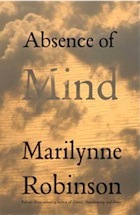Absence of Mind: The Dispelling of Inwardness from the Modern Myth of the Self (Terry Lectures)Armstrong no doubt endorses this book because it echoes her own belief in the value of religion. For me, it's the defense of subjectivity, the belief that our inner lives have value and meaning, and serve as a way to know the world. The privileging of objective science over subjective experience is deadly to our psyches and our culture.
by Marilynne Robinson
176pp, Yale University Press
Absence of Mind by Marilynne Robinson
Karen Armstrong hails a profound and timely argument against the positivist world view

Karen Armstrong
The Guardian,

'Bones, feathers and wishful thinking'? . . . Greek Orthodox bishops
conducting a service Photograph: Gali Tibbon/AFP/Getty ImagesAt the same time as the western scientific revolution empowered human beings, opened new worlds and broadened their horizons, it progressively punctured their self-esteem. Increasingly, luminaries of modern thought have told us that our minds are not to be trusted: that even though we thought we were standing on a static Earth, our planet was moving very fast indeed; that we could never be sure that our ideas corresponded to objective reality outside our own heads; that some of our noblest ideals were simply the product of repressed sexuality; and that, finally, we are deluded if we imagine that we "think", "reason," "learn" or "choose". Our minds are simply a passive conduit for an unknown, indifferent force.
In this published version of the Terry lectures, delivered at Yale University last year, the novelist Marilynne Robinson argues that positivism, the belief that science is the only reliable means to truth, has adopted a "systematically reductionist" view of human nature. Since Huxley, for example, Darwinians have found altruism problematic, as evolution would necessarily select against benevolence to another at cost to oneself. Altruism can only occur because of the "selfishness" of a gene. Thus for EO Wilson, a "soft-core altruist" expects reciprocation from either society or family; his byzantine calculations are characterised by "lying, pretence and deceit, including self-deceit, because the actor is more convincing who believes that his performance is real". Every apparently compassionate action is, therefore, simply a matter of quid pro quo.
In the same way, because it transfers useful information to somebody else and requires an expenditure of time and energy, language seems essentially altruistic. But, says the evolutionary biologist Geoffrey Miller, "evolution cannot favour altruistic information-sharing", so the complexities of language probably evolved simply for verbal courtship, "providing a sexual payoff for eloquent speaking by the male and female".
"Oh, to have been a fly on the wall!" Robinson comments wryly, when our "proto-verbal ancestors found mates through eloquent proto-speech". In the same way, art may appear to be "an exploration of experience, of the possibilities of communication, and of the extraordinary collaboration of eye and hand," but according to some neo-Darwinians, it too is simply a means of attracting sexual partners. "Leonardo and Rembrandt may have thought they were competent inquirers in their own right, but we moderns know better."
This disdainful "hermeneutics of condescension" cannot function outside of a narrow definition of relative data. Nowhere is this more apparent than in the positivist critique of religion. Daniel Dennett, for example, defines religion as "social systems whose participants avow belief in a supernatural agent or agents whose approval is to be sought". He deliberately avoids the contemplative side of faith explored by William James, as if, Robinson says, "religion were only what could be observed using the methods of anthropology or of sociology, without reference to the deeply pensive solitudes that bring individuals into congregations". Bypassing Donne, Bach, the Sufi poets and Socrates, Dennett, Dawkins and others are free to reduce the multifarious religious experience of humanity "to a matter of bones and feathers and wishful thinking, a matter of rituals and social bonding and false etiologies and the fear of death".
Robinson takes the science-versus-religion debate a stage further. More significant than this jejune attack on faith, she argues, is the disturbing fact that "the mind, as felt experience, has been excluded from important fields of modern thought" and as a result "our conception of humanity has shrunk". Robinson's argument is prophetic, profound, eloquent, succinct, powerful and timely. It is not an easy read, but one of her objectives is to help readers appreciate the complexity of these issues. To adopt such a "closed ontology", she insists, is to ignore "the beauty and the strangeness" of the individual mind as it exists in time. Subjectivity "is the ancient haunt of piety and reverence and long, long thoughts. And the literatures that would dispel such things refuse to acknowledge subjectivity, perhaps because inability has evolved into principle and method."
In the past, the voices that say "there is something more" have always been right. The positivist approach would not only marginalise religion, but also the arts, culture, history, and the classical and humanist traditions. Most prescient of all is Robinson's contention that "it is only prudent to make a very high estimate of human nature, first of all in order to contain the worst impulses of human nature, and then to liberate its best impulses."
I wish she had developed this crucial insight, because it is urgently needed at this moment of crisis in human history. If we are indeed completely in thrall to the selfish gene, why not throw all constraint to the winds and just be selfish – individually and collectively, in our politics, social arrangements, financial and economic dealings? We saw during the 20th century (not to mention the first decade of the 21st) what can happen when the "me-first" mentality is given free rein. But this was also the century of Mahatma Gandhi, Martin Luther King, and Nelson Mandela, who revealed the potential for altruism in humanity. The tens of thousands of people who flock to hear the Dalai Lama seem to recognise that this too is an essential part of human nature.
Karen Armstrong's The Case for God: What Religion Really Means is published by Bodley Head - available in paperback in September.
8 comments:
there seems to be a glitch causing the bottom part of your post to be unreadable.
Thanks for the heads up! Is it fixed?
Yes, thank you!
Sweet article. Is this the same Ms. Robinson that wrote the novel 'Housekeeping'?
I believe it is - she is a novelist first and foremost, best known for Gilead, I think.
Then it is the same writer. Housekeeping is an earlier work and was made into a film which I enjoyed many years ago.
Gilead sounded interesting, but I didn't get around to it.
"For me, it's the defense of subjectivity, the belief that our inner lives have value and meaning, and serve as a way to know the world."
Imagination is not a way to know the world. We don't vote on reality. The universe isn't a democracy when it comes to facts.
"The privileging of objective science over subjective experience is deadly to our psyches and our culture."
Using words like "privileging" marks you as a postmodernist jackass. You're only defending your crony because you know she is one of you. Your statement is literally meaningless, and furthermore, culture is not a living thing, and doesn't have a right to life. To use your own language, you are now "privileging" culture over human beings. Jackass.
Why is it that the most astute comments come from people who chose to remain anonymous?
Oh, but seriously.
I would normally explain to you the many ways in which your comment reveals your own ignorance, but being a jackass, all I have to say is, "Hee Haw!"
Post a Comment